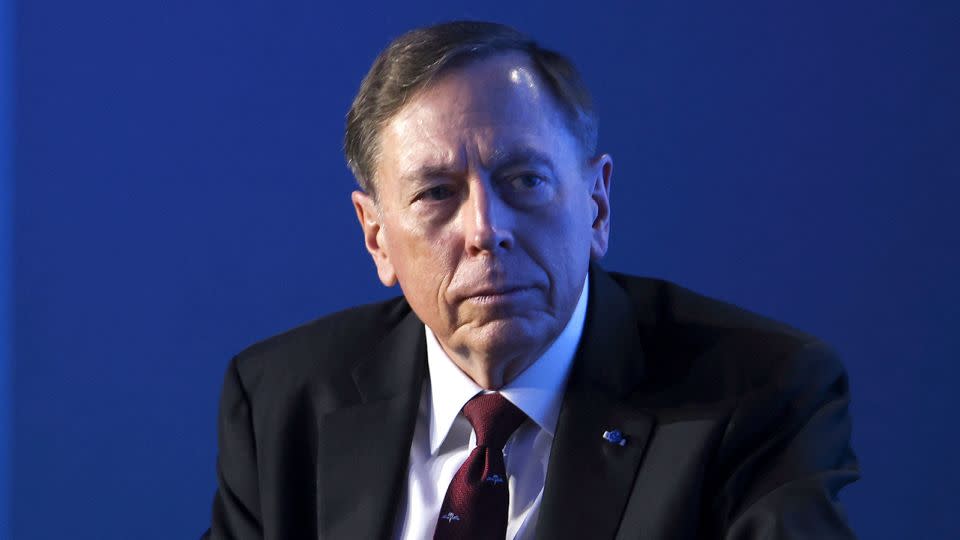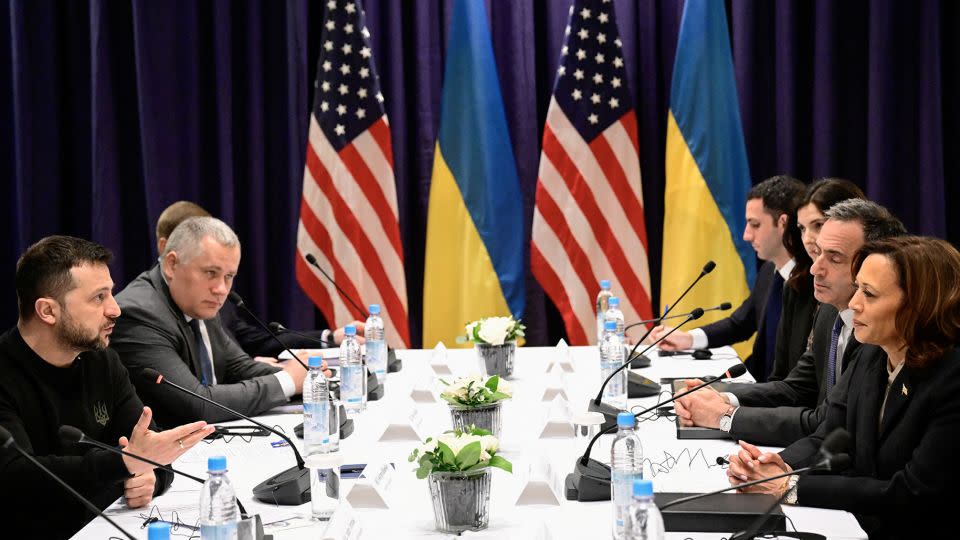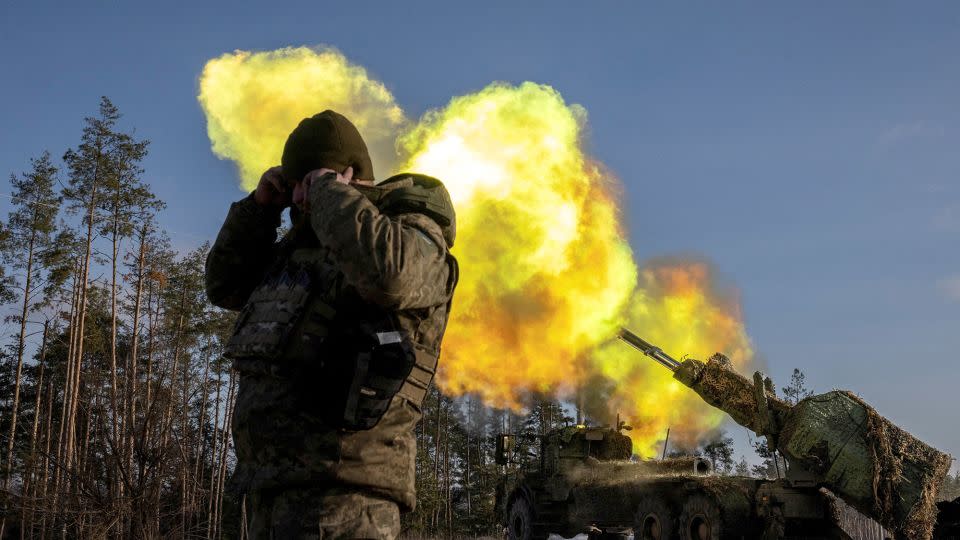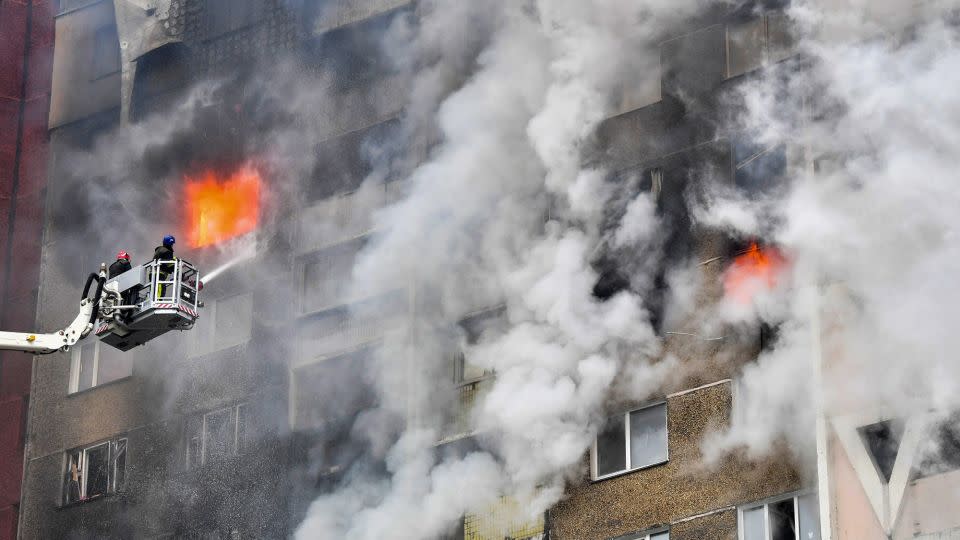Opinion: Who is winning? Gen. Petraeus on Ukraine war, two years in
- Oops!Something went wrong.Please try again later.
- Oops!Something went wrong.Please try again later.
Editor’s Note: Peter Bergen is CNN’s national security analyst, a vice president at New America, a professor of practice at Arizona State University, and the host of the Audible podcast “In the Room,” also on Apple and Spotify. He is the author of The Cost of Chaos: The Trump Administration and the World.” The views expressed in this commentary are his own. Read more opinion at CNN.
Two years into the Ukraine war, the tide has shifted, and Russian forces have some momentum, according to retired US General David Petraeus.
But he said the Russians have suffered staggering casualties and Ukraine can still hold its own in fighting off Russian President Vladimir Putin’s invasion if it gets the support it needs from the United States.
Russia’s full-scale invasion of Ukraine, which began disastrously for Putin, marks its second anniversary this coming weekend. To get a better insight into the state of the war, I spoke to former CIA director David Petraeus, who was the commanding general during the US-led wars in Afghanistan and Iraq and is co-author with Lord Andrew Roberts of the new book “Conflict: The Evolution of Warfare from 1945 to Ukraine.”

Last weekend Gen. Petraeus was at the Munich Security Conference, the leading global national security conference that was attended by pretty much every European leader and by top American officials – including Vice President Kamala Harris and Secretary of State Antony Blinken.
The atmosphere at the conference was somber, happening as the shocking news of Alexey Navalny’s death emerged and in the shadow of Ukraine’s withdrawal from the key eastern city of Avdiivka, all putting into sharp focus the impassioned pleas from Ukrainian President Volodymyr Zelensky for additional military assistance.
Shortly after the conference ended, I spoke with Gen. Petraeus. Our conversation has been lightly edited for clarity.
BERGEN: At the Munich Security Conference, what was the mood like?
PETRAEUS: It was different than any Munich Security Conference I’ve ever been to in the past – and I’ve been going to these since I was a major and a speechwriter for the Supreme Allied Commander of Europe in the late 1980s.
Typically, you have the US delegation there that is pushing everyone else to do more. But this time, the Europeans had never been more serious, while there was considerable uncertainty about the American side: concerns about the US commitment to continued support for Ukraine and concerns about US willingness to continue to provide its very important leadership in the world in general.
There were heartening elements – the Europeans are stepping up, for instance, with the German Chancellor Olaf Scholz on stage at the conference committing to spend 2% of Germany’s GDP on defense. Keep in mind that’s the number three economy in the world now, so that’s a significant development. And NATO Secretary General Jens Stoltenberg announced that this year 18 of 31 NATO nations will meet the 2% of GDP on defense commitment, marking a steady increase among European members.
Despite Europe very much stepping up – and the EU just before the Munich Security Conference announced an additional 50 billion euros in aid to Ukraine – the additional American support is hanging in the balance in the US Congress, and that is desperately needed.

That said, many of the House members who were at the Munich conference, including some of the Republicans that are firm on defense and resistance to Russia, believe that the votes are there and that they’ll be able to get this through.
But the delay, the indecisiveness, the uncertainty certainly was something that weighed on the mood at Munich.
Putin looks at the stalled legislation in the US Congress and the seeming inability to make a decision there to support a fellow democracy that broadly shares our values and principles – however imperfectly, they do – that has been brutally invaded. And then he looks to the US presidential election in November, and he looks at some of the rhetoric in the campaign, and undoubtedly, he draws some hope from that as well.
BERGEN: Who’s winning the war in Ukraine?
PETRAEUS: I’m not sure that either side is winning the war. The Russians obviously have been achieving incremental gains, and the Russians do have the initiative right now, having just forced the Ukrainians to withdraw from Avdiivka in the southeast.
There are several other areas in which the Russians are attacking in the east and south and using massive quantities of artillery that generally destroy whatever it is that they’re trying to seize and then using human wave attacks that are extraordinarily costly in terms of casualties, yet they seem to be able to sustain that. Vladimir Putin seems unconcerned by these losses and still seems to be able to continue to generate additional recruits.
One question, of course, is: might there come a point where the Russian people, particularly Russian mothers and fathers and wives, say, ‘Not my son, not my husband anymore’? And there have been modest demonstrations to bring the boys home, although that has certainly not reached substantial quantity nor been particularly influential.
Russia also has a long history of not permitting opposition for any considerable period. Alexey Navalny just died in prison (CNN: the Kremlin has denied allegations of involvement), and a Russian helicopter pilot who defected to Ukraine earlier in the war was just found shot to death in Spain (CNN: Moscow said it had no information on the matter). It’s essentially removing any illusion that the Russian Federation is anything other than a Stalinist dictatorship.
BERGEN: Are you surprised we’re now two years into this war with no end in sight?
PETRAEUS: Well, not necessarily. While the Ukrainians did demonstrate really quite impressive combat operations in the first year of the war – winning the battles of Kyiv, Kharkiv, Chernihiv, Sumy and Kherson – once the battle lines hardened and the Russians were able to establish defenses, the counteroffensive hinged on the provision of certain weapon systems in a sufficiently timely manner that the Ukrainians would be able to deploy in large numbers. And, obviously, that did not happen.
While the US-led response to the invasion has been very impressive in many respects, there were delays in certain decisions that meant that the Ukrainians did not have US tanks in a timely manner, for example, and that decision led to German delays in approval of the German Leopard tanks. The Ukrainians also didn’t have the Western aircraft that would have provided air support for their ground forces.
The US also needs to supply Ukraine with more long-range Army Tactical Missile Systems, ATACMS, which allow the Ukrainians to accurately hit distant targets in Russian-controlled territory.

So, when you take that into account, I think not a surprise. The Russians have certainly learned certain lessons after seemingly not being able to do that for the first year or more of the war. They have found a way to generate replacement personnel and additional units, and Russia has put its economy on a full-war footing, and this is where the reality enters the picture, as Russia has more than three times the population of Ukraine and an economy that’s more than 10 times the size of Ukraine’s.
If US support is forthcoming, I think you will see Ukraine able to at the very least sustain its present position, perhaps even make further progress in the one theater where there have been very impressive Ukrainian achievements – and that’s in the western Black Sea. There, through the use of anti-ship missiles, some produced in Ukraine, some provided to Ukraine, and then the use of maritime drones developed by Ukraine, the Russian Black Sea Fleet has probably sustained about 30% losses. It has largely been pushed out of the western Black Sea and has had to withdraw the bulk of its fleet from the critical port of Sevastopol in occupied Crimea, a port that it has used for a couple of centuries.
And this is a critical achievement because it’s allowing Ukraine to export its grain through the western Black Sea to countries that are very dependent on that in North Africa, including particularly Egypt.
BERGEN: Last week the Pentagon gave a background briefing to reporters, and they gave what I thought was a pretty astonishing estimate of the number of Russian forces killed or wounded: 315,000. What do you make of that?
PETRAEUS: These are just staggering losses. And yet there is a seeming lack of concern in the Kremlin because they seem to be able to continue to recruit by using substantial enlistment bonuses in rural areas. Keep in mind, of course, Putin is shielding the elite in Moscow and St. Petersburg; the burden is not falling on them. It’s falling on these young men in the much more rural areas.
Putin’s certainly in a much better position than was the case, say, a year ago, and that’s obviously concerning. But if the US can get this $60 billion package through and Ukraine makes fundamental decisions about how to increase its force generation – and that is a critical issue – and can continue to make progress with the development of both maritime and air drones, Ukraine, I think, can not only sustain its position but, in certain cases, make progress. But that’s a lot of assumptions. That’s a lot of ifs that all have to come together.
BERGEN: Ukrainian president Zelensky recently fired his army chief. Do you think that’s going to make a difference?
PETRAEUS: I don’t think that this changes the very fundamental issues that are the most significant factors that will determine the way ahead for Ukraine.
In particular, Ukraine has to come to grips with how to generate replacement forces, and it has to make a very difficult choice. The Ukrainian parliament has to make some fundamental decisions about recruiting ages, noting that the average age of a Ukrainian soldier on the front lines is not the 18-to-23 that I was privileged to lead in Iraq and Afghanistan. It’s over 40. This is a result of their recruiting policies, and they’re going to have to change that. (Under Ukrainian law, men between the ages of 18 to 26 can’t be drafted, though they can volunteer).
It’s very clear that this is an emotional subject, understandably so, and it will be difficult, but it’s necessary.
BERGEN: If Ukraine loses the war, what’s next? Would Putin feel empowered to attack a NATO country, or have Russia’s losses in this war degraded its ability to invade another country?
PETRAEUS: There’s no question that Putin would not stop at Ukraine. The question is, how long would it take him to regenerate the forces for employment elsewhere? Certainly, Moldova would be in the crosshairs. There are still, after all, 1,500 or so Russian soldiers on the ground in that sliver of land, Transnistria, in Moldova.
His attention could also shift to the Baltic states as well, whose existence he also resents.
His goals all along have been to reassemble as much of the Soviet Union or perhaps the Russian Empire as he possibly can, with him at the helm as the czar.
BERGEN: What’s going on in Ukraine looks a lot like World War I, in the sense that it’s trench warfare, minefields, machine guns. Obviously, there are new techniques, like swarms of armed drones. What does this war look like to you?
PETRAEUS: There are elements of World War I here — the trenches; the belts of defensive fortifications; barbed wire; very, very deep minefields; huge quantities of artillery, especially on the Russian side. You also have the Cold War-era tanks and infantry-fighting vehicles, which is largely what you see on this battlefield.
And then, on top of all this, you have some fairly advanced drones. Some are “suicide” drones. You also have precision missiles in the air and at sea, and you have maritime drones. Electronic warfare is also much more significant. There are activities in cyberspace. There is even involvement of capabilities in outer space that enables command, control, and communications, Starlink satellite communications, of course, being one of those.

And you have the advent of the enormous transparency that comes from the ubiquitous presence of smartphones, internet access and social media platforms.
So it’s truly different from any previous context for warfare, and it gives us hints as to the future of war that Andrew Roberts and I describe in our book, “Conflict.”
BERGEN: The Biden administration and Congress have already sent around $75 billion in aid to Ukraine. Why should Americans spend more on funding the Ukrainians?
PETRAEUS: Because it’s in our fundamental national security interest. It’s in the interest of our prosperity and the rules-based international order that we and our allies and partners in the wake of World War II established, which, for all of its imperfections, generally furthered our interests and those of our allies and partners.
Other countries – Russia and its various confederates around the world – are trying to make the world safe for autocracy, not safe for democracy, and our interests and those of our NATO allies and the free world are defended now at the Ukraine-Russia border.
This is not charity. What we do around the world is not out of the goodness of our heart. It’s out of a cold calculation. It is in our national interest to do so, and that if we do not do so, conditions in the world will change in ways that will not be positive for either our national security or our national prosperity.
BERGEN: Do you take at face value former President Donald Trump’s threats to pull the US out of NATO, and what would that do to the alliance?
PETRAEUS: The United States is, at the end of the day, the keystone for NATO capabilities. Even though the NATO secretary general reports that this year 18 of 31 countries will hit the 2% of GDP spending on defense that was agreed upon a decade or so ago, still, the US military is the foundation piece for any NATO operation and for deterrence of would-be aggressors.
So NATO, in many respects, is dependent on decisions made in the Oval Office, and those recent statements were a source of concern at the Munich Security Conference. All Americans who were there were questioned at various times about that, and the fundamental character of NATO and alliance deterrence would obviously be undermined enormously if the US were not to continue to play the role that it has, while led by presidents of either party, since the founding of NATO many decades ago in the wake of World War II.
BERGEN: What do you make of the reports that Russia is developing some kind of anti-satellite weapon, possibly with some nuclear component? Wouldn’t that be pretty dangerous for every country, including the Russians potentially, since they are as dependent on satellite systems as any other country.
PETRAEUS: It would. We should note here, we don’t know whether the nuclear element here is for nuclear power, the way some of our satellites have, or if it’s an actual nuclear weapon – whether a nuclear-powered satellite with some kind of electromagnetic pulse weapon – or if it actually carries a nuclear device that could be used in an anti-satellite role.
The real challenge here is that this is enormously destabilizing, because the tens of minutes that the US has right now of warning of some kind of significant nuclear attack would be reduced quite dramatically if the intelligence, surveillance and reconnaissance assets that we have, many of them in space, were blinded and decisions had to be made immediately. “Crisis deterrence” would then be dramatically undermined.
So, it’s very dangerous, it’s very ill-advised and it’s also very provocative.
For more CNN news and newsletters create an account at CNN.com

